Andreev Andrey Andreevich
Definition:
People's Commissar of Railways of the USSR (from October 1931 to February 1935), member of the Politburo of the Central Committee of the All-Union Communist Party of Bolsheviks (1932-1952), Deputy Chairman of the Council of Ministers of the USSR (1946-1953)
Years of life: 1895-1971
Documents (7)
Fund 06 / Inventory 1 / Case Бируля Леонид Михайлович
1. "Walking through the torments", memoirs of Biruli L.M.
The author is a pensioner, a former railway engineer, head of a department at the Omsk Institute of Railway Engineers. The memoirs were written after reading an article in the Izvestia newspaper dated October 7, 1988 entitled "Bitter Memory". A native of Western Belarus, he was repressed in connection with the suspicion that he had been thrown into the Soviet Union in order to overthrow the Soviet regime. The author is a man exhausted not only by being in prison, but also by life's trials that fell to his lot after his release, who received the first group of disability while still in the camp. Hence the excited and very chaotic story of the years spent in the camp and after leaving it.
The beginning of the memoirs is a listing of groups of citizens who were subjected to repression from 1937 to 1945. Arrest on October 5, 1937 during a business trip from Omsk for the reconstruction of the Moscow-Kharkov road. An interrogation during which the screams of a tortured man could be heard from the corridor to the office, where the doors were apparently opened specifically for intimidation. The second interrogation, which was conducted by an investigator known for his sadism. Telling the accused what methods the interrogation will be carried out by: “standing up”, beating, keeping under a cold shower and staying in a pit with fetid water, where he will “die”. After a three-four-day punishment with a “stance”, which was carried out alternately for 24 hours a day by three investigators, almost in an unconscious state, the arrestee confessed to his counter-revolutionary activities. Description of being in a prison cell. Description of the stage preceding the placement in the camp, as a result of which the author's hands and feet were frostbitten, since he was wearing summer clothes, the same as during the arrest, and four kilometers to the station went in forty degrees of frost. Arrival at the Sevzheldorlag camp in January 1938. Description of the monstrous living conditions in it. Ways to which household workers resorted in order not to go to work. Sentencing - 10 years "to be served exclusively in the northern heavy camps." A written message to his wife about the deadline, a request to forget it in the name of his son, to arrange his life in a new way. A story about the ordeals of his wife after his arrest, about her serious illness that led to death, about her son, who ended up in an orphanage. Transfer from Sevzheldorlag to Ukhtizhimlag for designing work on the construction of a railway in the area where Ukhta oil and radium were mined. Appointment to a very responsible position of the head of the production and technical part of the construction site. Recognition of his project as extremely successful, for which a small (compared to the bonus to the chief boss) amount of 75 rubles was paid. Sending the bulk of the earnings to the family while they were still living at home. The struggle between Ukhtizhimlag and Sevzheldorlag for a valuable engineer. Transfer of the author again to Sevzheldorlag. Arriving at the camp for a date with his wife at a time when the author fell ill with dysentery. Provision for a visit by the camp doctor of his office. The expulsion of his wife from the camp by the atrocious chief, who learned about it. Famine in the camp. Death of people from scurvy and pellagra. Two terrible cases: a starving camper eats a live kitten in front of people, and the lads eat the corpse of a man who has just fallen from the bridge down where work was going on. Eating morels in the spring, from which some died due to the inability and inability to cook them. The certainty that, if not for the engineering work, death would be inevitable in a few months. Obtaining the first group of disability. Chamber for the dying. Unauthorized departure from the hospital for several hours (there was a pass) to eat taiga berries, which were abundant in the forest, thanks to which he did not die.
1942 - the end of camp life. Inability to get a job after imprisonment. Teaching ban. Living in a cousin's house with his son taken from an orphanage. The request of the poet Yakub Kolos, deputy of the Supreme Soviet of the BSSR, a relative of the author, to the Supreme Soviet of Belarus for the restoration of the author in the school, which was granted. A court case regarding the inheritance, as a result of which an unfair decision was made, according to which Birulya had to pay for the lawsuit brought against him for many years. Again the decision of the district committee of the party to ban him from teaching. The intercession of the secretary of the regional committee, since positive feedback was given from the school about the work of the author. The requirement of the NKVD on the periodic submission of characteristics from work. The admission of the son, who graduated from school with a medal, to the institute. Rehabilitation after the death of Stalin. Retirement. Despite the fact that the author approached in his memoirs to sum up his life, a sudden transition again to the description of the camp days. About the attempts of the prisoners to start a rebellion, which ended badly for them. About the secret, closed camp, the requirements for the brigades working on the railway to lie down and not look when the prisoners being transported were unloaded from the trains. Rumors that they did not work there, and the camp itself was destroyed. An insignificant part of the people was sent to Kolyma and Vorkuta, the rest died on the spot. Information about the fate of repressed relatives and friends. Again, the return of memories to the sad fate of his wife, about his camp correspondence with the teacher of the orphanage, where his son was, about her dismissal from work for this. The author's lament that no one was punished for unfair arrests and horrendous treatment of innocent people in the camps. The story is about one case that happened in the camp with the author during his work on construction and which almost led to another court case.
The end of memories - a message about fellow villagers of the village of Nikolaevshchina, who fled from the Polish lords in the 20s to the Soviet Union and who suffered in 1937: who was shot, who died in prisons and camps.
The annotation was compiled by Zhidkova T.G.
The beginning of the memoirs is a listing of groups of citizens who were subjected to repression from 1937 to 1945. Arrest on October 5, 1937 during a business trip from Omsk for the reconstruction of the Moscow-Kharkov road. An interrogation during which the screams of a tortured man could be heard from the corridor to the office, where the doors were apparently opened specifically for intimidation. The second interrogation, which was conducted by an investigator known for his sadism. Telling the accused what methods the interrogation will be carried out by: “standing up”, beating, keeping under a cold shower and staying in a pit with fetid water, where he will “die”. After a three-four-day punishment with a “stance”, which was carried out alternately for 24 hours a day by three investigators, almost in an unconscious state, the arrestee confessed to his counter-revolutionary activities. Description of being in a prison cell. Description of the stage preceding the placement in the camp, as a result of which the author's hands and feet were frostbitten, since he was wearing summer clothes, the same as during the arrest, and four kilometers to the station went in forty degrees of frost. Arrival at the Sevzheldorlag camp in January 1938. Description of the monstrous living conditions in it. Ways to which household workers resorted in order not to go to work. Sentencing - 10 years "to be served exclusively in the northern heavy camps." A written message to his wife about the deadline, a request to forget it in the name of his son, to arrange his life in a new way. A story about the ordeals of his wife after his arrest, about her serious illness that led to death, about her son, who ended up in an orphanage. Transfer from Sevzheldorlag to Ukhtizhimlag for designing work on the construction of a railway in the area where Ukhta oil and radium were mined. Appointment to a very responsible position of the head of the production and technical part of the construction site. Recognition of his project as extremely successful, for which a small (compared to the bonus to the chief boss) amount of 75 rubles was paid. Sending the bulk of the earnings to the family while they were still living at home. The struggle between Ukhtizhimlag and Sevzheldorlag for a valuable engineer. Transfer of the author again to Sevzheldorlag. Arriving at the camp for a date with his wife at a time when the author fell ill with dysentery. Provision for a visit by the camp doctor of his office. The expulsion of his wife from the camp by the atrocious chief, who learned about it. Famine in the camp. Death of people from scurvy and pellagra. Two terrible cases: a starving camper eats a live kitten in front of people, and the lads eat the corpse of a man who has just fallen from the bridge down where work was going on. Eating morels in the spring, from which some died due to the inability and inability to cook them. The certainty that, if not for the engineering work, death would be inevitable in a few months. Obtaining the first group of disability. Chamber for the dying. Unauthorized departure from the hospital for several hours (there was a pass) to eat taiga berries, which were abundant in the forest, thanks to which he did not die.
1942 - the end of camp life. Inability to get a job after imprisonment. Teaching ban. Living in a cousin's house with his son taken from an orphanage. The request of the poet Yakub Kolos, deputy of the Supreme Soviet of the BSSR, a relative of the author, to the Supreme Soviet of Belarus for the restoration of the author in the school, which was granted. A court case regarding the inheritance, as a result of which an unfair decision was made, according to which Birulya had to pay for the lawsuit brought against him for many years. Again the decision of the district committee of the party to ban him from teaching. The intercession of the secretary of the regional committee, since positive feedback was given from the school about the work of the author. The requirement of the NKVD on the periodic submission of characteristics from work. The admission of the son, who graduated from school with a medal, to the institute. Rehabilitation after the death of Stalin. Retirement. Despite the fact that the author approached in his memoirs to sum up his life, a sudden transition again to the description of the camp days. About the attempts of the prisoners to start a rebellion, which ended badly for them. About the secret, closed camp, the requirements for the brigades working on the railway to lie down and not look when the prisoners being transported were unloaded from the trains. Rumors that they did not work there, and the camp itself was destroyed. An insignificant part of the people was sent to Kolyma and Vorkuta, the rest died on the spot. Information about the fate of repressed relatives and friends. Again, the return of memories to the sad fate of his wife, about his camp correspondence with the teacher of the orphanage, where his son was, about her dismissal from work for this. The author's lament that no one was punished for unfair arrests and horrendous treatment of innocent people in the camps. The story is about one case that happened in the camp with the author during his work on construction and which almost led to another court case.
The end of memories - a message about fellow villagers of the village of Nikolaevshchina, who fled from the Polish lords in the 20s to the Soviet Union and who suffered in 1937: who was shot, who died in prisons and camps.
The annotation was compiled by Zhidkova T.G.
39 листов, файл (присоединённый)
Andreev Andrey Andreevich,
Anna Abramovna,
Attrevich (Atperevich),
Birulya Leonid Mikhailovich,
Biryukova,
Brezhnev Leonid Ilyich,
Mountain,
Gusarevich,
Demidovich Lyubov Petrovna,
Demidovich T.I.,
Drobyshev,
Drozdovsky,
Ermakovich Lydia,
Zhelezko,
Kartashov,
Kwiatkovsky,
Klyuchkin Iosif Ilyich,
Kolas Yakub,
Krasnoshtan,
Krivel Ivan Pavlovich,
Loiko Adam,
Lukovskaya,
Mazur,
Maiko,
Markelov,
Mironenko,
Mitskevich Valentina Mikhailovna,
Mitskevich Vladimir,
Mitskevich Ignatius Yurievich,
Moroz Yakov Moiseevich,
Ovchinnikov,
Osipova,
Parkhomenko E.M.,
Pisarchuk,
Puchkov Ivan,
Stalin Joseph Vissarionovich,
Tadarsky,
Khrushchev Nikita Sergeevich,
Shamshin,
Shchemin,
Jacobi Jacob,
Yatskovsky Alexander
Fund 03 (Б-2) / Inventory 1 / Case Лупынис Анатолий Иванович
2. Biographical information on Lupynis A.I. in AS No. 4494 [not earlier than 06/06/1981].
6 листов, 6 изображений, ксерокопия машинописи






Andreev Andrey Andreevich,
Vinogradov doctor,
Ivanov V. court,
Lupynis (Lupinos) Anna Anisimovna,
Lupynis (Lupinos) Ivan Trofimovich,
Lupynis (Lupinos, Lupynos) Anatoly Ivanovich,
Malevany Vladimir I.,
Nikiforov O.I.,
Popov,
Rudenko Roman Andreevich,
Stalin Joseph Vissarionovich,
Storchevoy I.Yu.,
Khrushchev Nikita Sergeevich
1981
Fund 03 (Б-2) / Inventory 10 / Case Дело по обвинению Пименова Р.И. и других, в 10 томах, т. 6
3. Report of the First Secretary of the CPSU Central Committee N.S. Khrushchev To the XX Congress of the CPSU 02/25/1956 “On the cult of personality and its consequences, with comments by R.I. Pimenov and an inscription by L.M. Shcherbakova: “Seized during a search in my room on 03/25/1957. It was in my son's books." An envelope with evidence.
21 лист, 21 изображение, ксерокопия





















Pimenov Revolt Ivanovich,
Shcherbakova (ur. Pimenova) Larisa Mikhailovna,
Khrushchev Nikita Sergeevich,
Lenin (Ulyanov) Vladimir Ilyich,
Stalin Joseph Vissarionovich,
Krupskaya Nadezhda Konstantinovna,
Kamenev Lev Borisovich,
Zinoviev (Radomyslsky) Grigory Evseevich,
Trotsky Lev Davidovich,
Bukharin Nikolai Ivanovich,
Mrachkovsky Sergey Vitalievich,
Rykov Alexey Ivanovich,
Kerensky Alexander Fedorovich,
Beria Lavrenty Pavlovich,
Kirov Sergey Mironovich,
Enukidze Avel Safronovich,
Nikolaev Leonid Vasilievich,
Molotov Vyacheslav Mikhailovich,
Zhdanov Andrey Alexandrovich,
Kaganovich Lazar Moiseevich,
Yezhov Nikolay Ivanovich,
Yagoda Genrikh Grigorievich,
Abakumov Viktor Semenovich,
Vyshinsky Andrey Yanuarievich,
Zaporozhets Ivan Vasilievich,
Borisov M.V.,
Dzerzhinsky Felix Edmundovich,
Postyshev Pavel Petrovich,
Kalinin Mikhail Ivanovich,
Minin,
Eikhe Robert Indrikovic,
Shlyapnikov Alexander Gavrilovich,
Rukhimovich Moisey Lvovich,
Rudzutak Yan Ernestovich,
Nikolaev-Zhurid Nikolay Galaktionovich,
Ushakov Zinoviy Markovich,
Mezhlauk Valery Ivanovich,
Rosenblum Alexander Moiseevich,
Komarov Nikolay Pavlovich,
Zakovsky Leonid Mikhailovich,
Chudov Mikhail Semenovich,
Shaposhnikova Ludmila Kuzminichna,
Ugarov Alexander Ivanovich,
Smorodin Petr Ivanovich,
Pozern Boris Pavlovich,
Kabakov Ivan Dmitrievich,
Chubar Vlas Yakovlevich,
Kosarev Alexander Vasilievich,
Kosior Stanislav Vikentievich,
Rhodes Boris Veniaminovich,
Hitler Adolf,
Churchill Winston,
Cripps Stafford,
Vorontsov Mikhail Alexandrovich,
Khlopov,
Malenkov Georgy Maximilianovich,
Kirponos Mikhail Petrovich,
Rokossovsky Konstantin Konstantinovich (Ksaverevich),
Gorbatov Alexander Vasilievich,
Meretskov Kirill Afanasyevich,
Podlas Kuzma Petrovich,
Bagramyan Ivan Khristoforovich,
Paasikivi Juho Kusti,
Lozovsky (Drizo) Solomon Abramovich,
Vasilevsky Alexander Mikhailovich,
Mikoyan Anastas Ivanovich (Ovanesovich),
Zhukov Georgy Konstantinovich,
Poskrebyshev Alexander Nikolaevich,
Voznesensky Nikolay Alekseevich,
Kuznetsov Alexey Alexandrovich,
Popkov Petr Sergeevich,
Rodionov Mikhail Ivanovich,
Baramia Mikhail Ivanovich,
Zodelava I. S.,
Rapava Avksentiy Narikievich,
Charkviani Kandid Nestorovich,
Chhubianishvili Zakhary Nikolaevich,
Gogua Vasily Barnabovich,
Rukhadze Nikolay Maksimovich,
Tito Broz Josip,
Timashuk Lidiya Feodosyevna,
Vinogradov Vladimir Nikitich,
Ignatiev Semyon Denisovich,
Kaminsky Grigory Naumovich,
Snegov Alexey Vladimirovich (Iosif Izrailevich Falikzon),
Kartvelishvili Lavrentiy Iosifovich (Lavrentiev),
Kedrov Igor Mikhailovich,
Golubev Vladimir Petrovich,
Baturina Antonina Vasilievna,
Andreev Andrey Andreevich,
Etinger Yakov Gilarievich,
Kogan Mikhail Borisovich,
Ordzhonikidze Grigory Konstantinovich (Sergo),
Marr Nikolay Yakovlevich
1957
Fund 03 (Б-2) / Inventory 1 / Case Григоренко Петр Григорьевич
8. Article by A. Kotsyubinsky “Is it worth canonizing the destroyer? General Grigorenko - psychological portrait" in the newspaper "Smena" No. 90 dated May 17, 1994.
1 лист, 1 изображение

Andreev Andrey Andreevich,
Vyshinsky Andrey Yanuarievich,
Grigorenko Georgy Petrovich,
Grigorenko Zinaida Mikhailovna,
Grigorenko Ivan Grigorievich,
Grigorenko Petr Grigorievich,
Daniel Yuly Markovich,
Egorov Alexey Mikhalovich,
Kabanov Modest Mikhailovich,
Kosterin Alexey Evgrafovich,
Kotsyubinsky Alexander P.,
Lunts Daniil Romanovich,
Malinovsky Rodion Yakovlevich,
Milshtein Ilya,
Polyanovsky Edvin Lunikovich,
Sinyavsky Andrey Donatovich (Abram Tertz),
Solzhenitsyn Alexander Isaevich,
Stalin Joseph Vissarionovich,
Tukhachevsky Mikhail Nikolaevich,
Khrushchev Nikita Sergeevich
1994
Fund 016 / Inventory 1 / Case 15
23-3. The indictment of the POU of the NKVD GUGB of the Pacific Fleet dated 03/08/1937 against Podrez A.K.
3 листа, 3 изображения



Fund 02 (Б-1) / Inventory 1 / Case Цыганов Корнилий Андреевич
50. Letter from K.A. Tsyganov dated March 18, 1944 from the settlement of Krasny Kamen, Nizhny Tagil, Sverdlovsk Region (on a postcard) to Maria Ivanovna Spirina about the receipt of two letters and gratitude for the parcels, about refusing the operation and about sending an application to the Central Committee of the All-Union Communist Party (Bolsheviks) with a request to replace the remaining term of imprisonment with sending to the front; with the stamp "Checked by military censor 13447"; (p/sh irzb/12.04.1944).
1 лист, 2 изображения, электронная копия
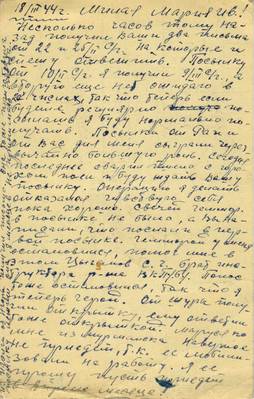
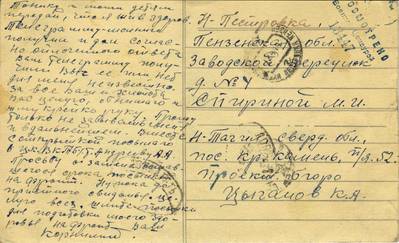
Fund 02 (Б-1) / Inventory 1 / Case Цыганов Корнилий Андреевич
52. Letter from K.A. Tsyganov, dated March 19, 1944, from the village of Krasny Kamen, Nizhny Tagil, Sverdlovsk Oblast, to his wife, A.I. Tsyganova, about sending postcards to all relatives and a statement to the Central Committee of the All-Union Communist Party (Bolsheviks) requesting that the remaining term of his imprisonment be replaced by dispatch to the front, about his health, which had improved thanks to the parcels, about a visit to the Tagilstroy administration for approval of the glass factory project he had developed, and with a request to continue to do everything possible to review his case.
2 листа, 4 изображения, электронная копия
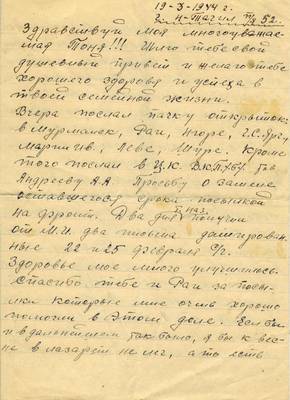
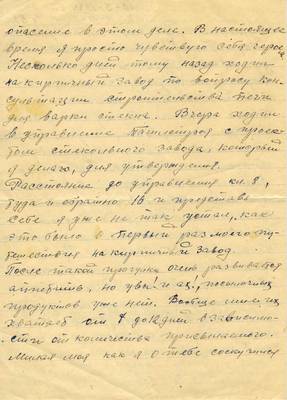
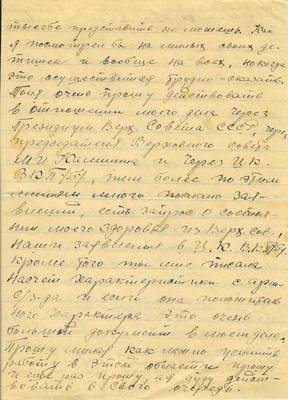
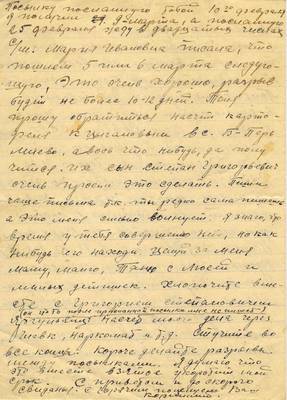
Tsyganov Kornily Andreevich,
Tsyganova Antonina Ivanovna,
Shipileva Raisa Andreevna,
Koshkina Anna Andreevna,
Yargulyants Grigory Stepanovich,
Spirina Maria Ivanovna,
Tsyganov Lev Kornilievich,
Tsyganov Alexander Andreevich,
Andreev Andrey Andreevich,
Kalinin Mikhail Ivanovich,
Tsyganov Stepan Grigorievich,
Medvedeva Anna Illarionovna,
Meshcheryakova Tatyana Ivanovna,
* Lucy
1944
Documents
Link copied to clipboard